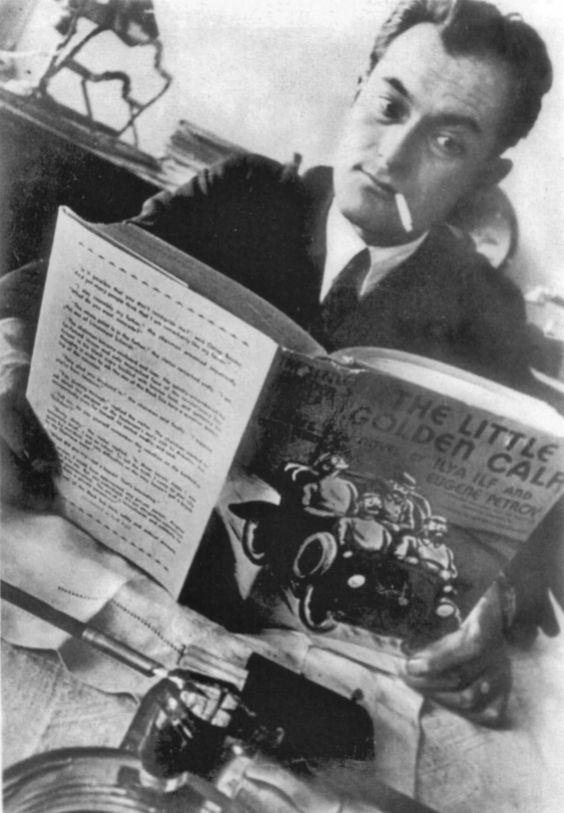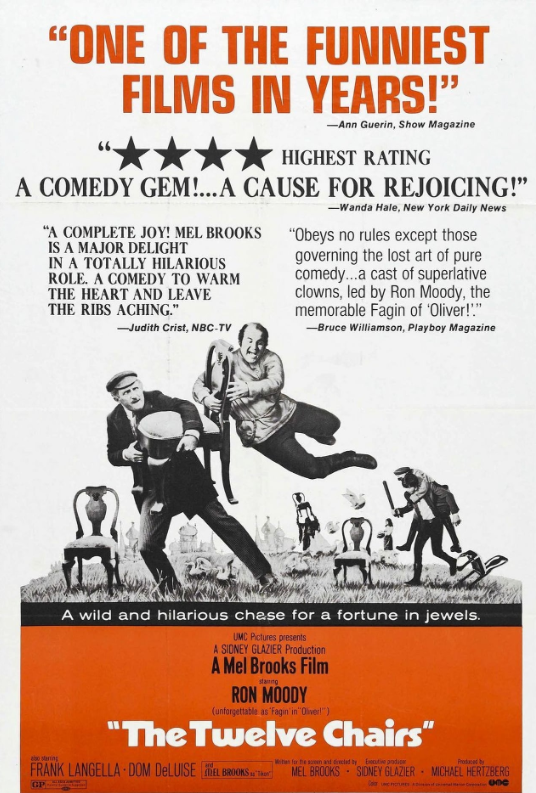Echoes of the Cyclops
Evgeny Petrov with first English edition of the novel
For those not familiar with them, Ilf and Petrov (natives of Odesa) were dubbed the court jesters of Stalin’s Russia, whose satirical novels the Twelve Chairs and the Little Golden Calf escaped the wrath of Soviet oppression. The books are still well loved and together with the films made of them are often quoted in Russia today. I shall be discussing the echoes of Odysseus’ Cyclops adventure found in the chess playing episode of the Twelve Chairs (Chapter 34). We shall go through the episode and point out the Homeric echoes and in conclusion speculate why they might be there.
The two protagonists, Ostap Bender, the resourceful trickster and Ippolit Vorobyaninov are in a quest to find a cache of diamonds hidden in a set of twelve chairs that had belonged to Vorobyaninov before the Revolution. At the opening of chapter 34 they find themselves thrown off a riverboat and left at the small town of Vasyuki on the Volga. Money is needed for food and to buy passage on a boat so Voryobyaninov has the task of sticking up posters advertising a chess lecture and simultaneous exhibition by one Grandmaster O. Bender. A chess “simul” as they are called is an event where a strong player will play several opponents on different boards, usually for a fee as in this case.
The “Grandmaster” meanwhile locates the “chess section” where he introduces himself as Grandmaster Bender to a one eyed man, (одноглазый человек) no prizes for guessing who he reminds us of, he will be given this moniker and no other name throughout. When he realizes he is talking to a Grandmaster his single eye opens as far as nature permits and he rushes off to fetch twelve people of different ages – echoing the twelve comrades that Odysseus takes with him (Od 9. 195) on the Cyclops expedition and like Odysseus’ comrades the other chess players will be unnamed and largely unidentified. Just as Odysseus identifies himself has having fought in the Trojan war (Od 259), Bender says he is still tired from a tournament in Carlsbad (likewise a historical event, because it actually took place four years before, we know the current date is 22 June 1927 from the poster).
Bender proceeds to bamboozle his listeners with a long intoxicating speech about how an international tournament would revolutionize the small town of Vasyuki and even open the path to interplanetary chess – Odysseus uses super strength wine to overcome Polyphemus. As a result of this he pockets 21 roubles from them for telegrams so he can start organizing the tournament and says he will see them in the evening for his lecture and simultaneous exhibition. The money is used on a meal for him and his accomplice Vorobyaninov, rather as Odysseus helps himself to some of the Cyclops’ food in the cave. Like Odysseus’ cautious comrades, Vorobyaninov is worried that they are pushing their luck, Bender reassures him of the soundness of his plan. By evening time he is ready for his lecture, while Vorobyaninov has rented the getaway boat to wait for him by the harbour.
The lecture (on a “fruitful opening idea”, like in Odyssey Book 9 food and gain are never far away) is a rather brief bluff and soon the simultaneous games start. It is worth mentioning that the chess terminology Bender uses is all correct in the Russian, unfortunately this is not the case in all the English translations. Homer, likewise, can use accurate specialist vocabulary, especially in the Odyssey. Unsurprisingly, Bender loses all the games easily (this is only the second time he has ever played chess) and after an argument with our one eyed friend, he throws a chess board at the lamp to plunge the room into darkness and make his escape.
Poster for the 1970 film adaptation of The Twelve Chairs by Mel Brooks
There follows a mad dash to the waiting boat with the defrauded chess players in pursuit who unleash a hail of stones (like the Cyclops of course) before they board a boat to give chase. The one eyed man’s eye now gleams like a light house in the night (echoing the grizzly but incandescent fate of the Polyphemus’ eye…) but lose equilibrium when they draw level and capsize. Like Odysseus, Bender treats himself to issuing a parting taunt. This is actually rather out of character. Bender is a highly resourceful trickster but does not usually add insult to injury and taunt his victims. Odysseus would have some justification because Polyphemus has infringed the rules of hospitality, as well as the small matter of eating several of his comrades.
In Ostap Bender (the name hints at a Turkish and possibly Jewish origin), Ilf and Petrov have created a character who has resonated in Russian consciousness ever since. In some ways he is a product of the New Economic Policy of the time, when a limited amount of free enterprise was reintroduced but his appeal has endured long after that and continues into the post Soviet era. Perhaps, like James Joyce’s Odysseus/Ulysses, Leopold Bloom, Ilf and Petrov saw the resourceful little man Odysseus as the Everyman protagonist of the modern era. They have added a an attractive dash of charisma and very pleasing wit, but deny him his happy homecoming. He is a con man after all.
The court jesters were satirists, but not subversives.
Works of Ilf and Petrov (in Russian) http://az.lib.ru/i/ilfpetrov/
12 Chairs in English (chess players will note that the chess terminology is not correctly translated) http://lib.ru/ILFPETROV/ilf_petrov_12_chairs_engl.txt
Film of the book with English subtitles, this episode starts at 1.45.00. https://www.youtube.com/watch?v=P8t2dbJ7YXY



